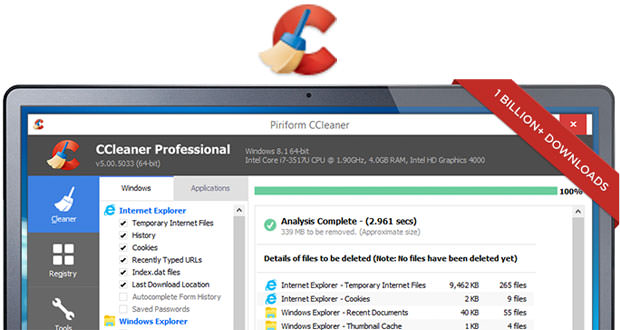Eye to CCleaner: Installed malware on the PC
The software for the maintenance of personal computers was the victim of a remote attack that injected a malware into its installation program. It seems there are no risks for the users involved.
A team of hackers managed to break into CCleaner’s security defenses to inject malware into millions of users. To find out, it was Cisco Talos, a computer security company that identified that the servers used by Avast were remotely compromised to distribute malicious software through the operating system’s cleanup and management suite. For those who do not know Avast is the company that owns the property of CCleaner.
” For a while, the legitimate version of CCleaner 5.33 distributed by Avast also contained multi-stage malware that was being executed by installing CCleaner, ” reads the company’s release.
According to data released by Avast, CCleaner has been downloaded over 2 billion times ever, which is why it has increasingly become a succulent dish for hackers. It is used to remove cookies, unwanted and resilient data on the computer, also offering various tools for the maintenance of the operating system 2.27 million users were involved in the latest attack, although it appears that the malware has not done any harm to them.
 This is an unusual aggression, the one against CCleaner, given the purpose of the software in use. Many users, experts or not, rely on the application to remove unwanted elements, and it seems that the attackers have aimed to undermine the credibility of the service. The inserted malware was designed to collect data such as the list of installed software, active processes, MAC addresses of network adapters and other information.
This is an unusual aggression, the one against CCleaner, given the purpose of the software in use. Many users, experts or not, rely on the application to remove unwanted elements, and it seems that the attackers have aimed to undermine the credibility of the service. The inserted malware was designed to collect data such as the list of installed software, active processes, MAC addresses of network adapters and other information.
Piriform, which deals with the development of the application, has also informed that, even if collected, the data was protected with cryptography so access would have taken some time. The offending version of the software was distributed in official channels from August 15th to September 12th and certified as safe by Symantec. The companies involved to have defined the case as certainly very serious, but have also said that ” there is no reason to fear repercussions for users “.

